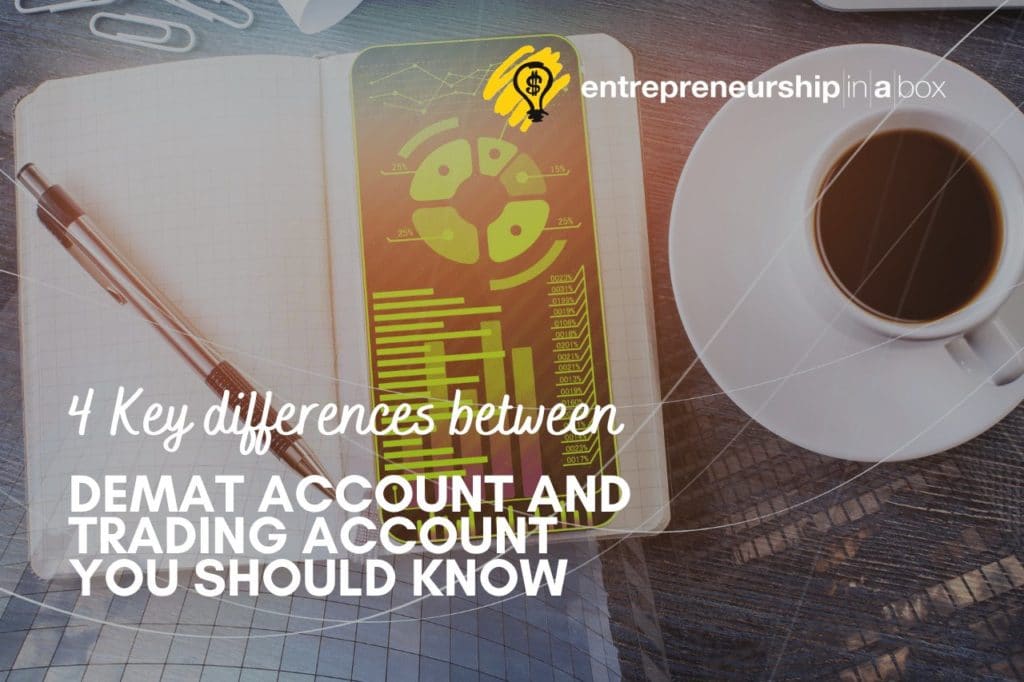There are plenty of compelling reasons to invest in the stock market and accrue wealth over time. With the increasing number of opportunities and options, it is the perfect investment destination. If you have been thinking of doing the same, there are a few important facts and concepts that you should know. The stock market trading is not as difficult and time-consuming as it used to be, thanks to the advancement of technology, the internet, and the NSDL (National Securities Depository Limited) who proposed the idea of Demat accounts.
There are two types of accounts needed for smooth online trading. The first is the Demat account which holds shares certificates in the electronic form and the other is a trading account that is used for buying and selling certificates in the stock exchanges of India. Although both the accounts serve different purposes, most of the new investors tend to get confused between the two. This confusion leads to the prevailing theory that there is no difference between Demat and trading accounts.
Demat and trading accounts coordinate with one another to serve convenient trading.
Key Differences Between Demat And Trading Account
If you wish to perform online trade efficiently in the Indian stock market, it is crucial to understand the difference between Demat and trading accounts. You can figure out the distinction very easily by finding the answers to a few common queries.
1. The functionality of Demat vs Trading Account
The major difference between Demat and trading account is the functionality of the two in the Indian stock market. The function of a Demat account is to convert shares and securities certificates in an electronic format for facilitating online transactions. On the other hand, a trading account is used for buying and selling stocks in the exchanges.
If you wish to trade in the biggest stock exchanges in India, that is, the BSE (Bombay Stock Exchange) and NSE (National Stock Exchange). As per the regulations of the SEBI (Securities and Exchange Board of India), you will not be allowed to participate in the stock exchanges of India.
2. Role In The Trading Process
The second difference between Demat and trading account is the role each one of them plays. The role of the former one is to ensure the security of the share certificates by storing them in one digital space. You must have heard of the time when traders had to store the physical form of these certificates which were more likely to get torn, damaged, or lost. Demat accounts eliminate the chance of any such happenings.
The trading accounts only serve the purpose of sale and purchase of bonds, shares, government securities, etc.
3. Nature of The Accounts
If you have to understand the nature of both the accounts in a generalized form, consider a simple comparison. Demat accounts are more like the personal savings account that you have in a commercial bank while a trading account is similar to your current account. The former is meant to save the documents securely while the latter serves the facility of quick transactions.
So, every time you will purchase shares or bonds, your trading account will be credited and when you would sell it, the account will be debited. After completion of the formalities of the exchanges, the certificate of the same will be reflected in the account statement of your Demat account.
4. Time Management Factor
The difference between Demat and trading account is also evaluated based on time management. As a Demat account is just for securing your shareholding certificates, it is reflected as a stock at the end of every financial year, that is, 31st March of every year. Trading accounts maintain a flow of sales and purchases, it is not measured at a certain point of time in the year.
Some Common FAQs (Frequently Asked Questions)
Is It Possible To Open A Demat Account Without Having A Trading Account?
No, there is no such obligation imposed either by the DP (Depository Participants) that offer the services or by the SEBI. You can open a Demat Account even if you have one share certificate that you need to convert electronically without having the trading account. However, when you decide to trade in the exchanges, you will have to open the latter one. The difference between Demat and trading account specifies no direct relation between the two.
Can I Open Both The Accounts With The Same Depository Partner?
Yes, you can open both the accounts with your preferred Depository Partner. In fact, financial experts advise the same as you will be able to manage both the accounts more conveniently. Some DPs also offer discounts to the investors who avail of the 2-in-1 account opening service. Now that you understand the difference between Demat and trading accounts thoroughly, you will not face any trouble while using both for performing trade activities in the Indian stock market. Enjoy the plethora of investment options and the experience of smooth online trading collectively!





